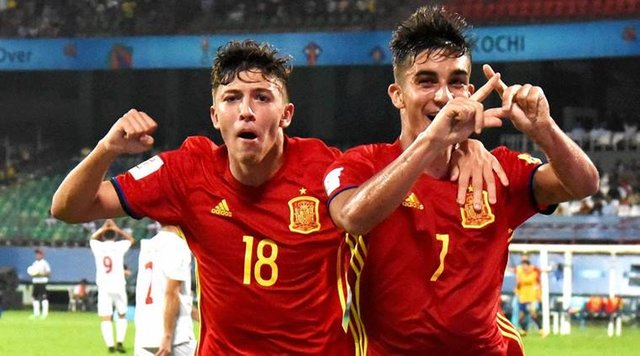FIFA U-17 World Cup: Meet Ferran Torres, future galactico who has shone on Indian shores
El nuevo Asensio. Or the new Asensio is how the Madrid press hyped up Ferran Torres, the sprightly winger whose influence was stamped all over Spain’s rout of Iran. The Catalan press alleges that it’s a conspiracy to lure him to the Bernabeu, as comparisons with Marco Asensio, the latest sensation in Spanish football, might tempt him to join Real Madrid. The latter, with the snooty arrogance of having prised out the real Asensio from the jaws of Barcelona, retort that Barcelona are merely jealous and trying to sabotage the move.

Whatever that be, Torres’s signature is vigorously coveted by the two giants of Spanish football, so much so that his club Valencia, increasingly annoyed by Madrid and Barcelona poaching players from its youth academy, had inserted a 22-million pound release clause. It might be a pittance for the bigwigs, but the tug of war for Torres would only intensify in the coming days.
More than it flatters him, the comparison with Asenio unsettles Torres.
“I’ve not reached anywhere near his calibre, but definitely, he’s someone every kid in Spain looks up to these days. And I’ll work really hard to reach his level,” he says, his initial shyness being replaced by an assertive tone.
Of course, he knows the knee-jerkiness of the media, their penchant to assign new monikers to players. Asensio was once the El nuevo Iniesta.
But hyperbolic as it might sound, he does share certain virtues of Asensio. First, and perhaps the biggest gift in a blossoming career, is his blinding speed, the ease with which he accelerates, especially with the ball. A reason Spain coach Santiago Denia assigned him a wider role against Iran. Generally, Spanish sides tend to constrict to the centre — they resemble a constellation of red stars with twinkling feet — but Iran’s non-possession- based philosophy forced a tweak in their tactic, which only amplified Torres’s threat. Resultantly most of Spain’s thrusts came from the right, like a blitzkrieg, and Torres was the conceptualiser as well as the orchestrator.
Gift of intuition
The second gift is his intuition, the ability to read the game and second-guess the opponent. The first goal against Iran bore ample proof.
From the corner of his eyes, Torres could see the muscular frame of Ahmad Jalabi storming towards him. The Spanish winger drifted further to his right, forcing Jalabi to plod his left leg at him. Then just at the moment Jalabi’s boots were at him, he leapt over him, the balance and poise smeared with a bewitching grace. Unlike several modern-day footballers, who need only the faintest of contacts to stumble, Torres continued his lungful burst.
The second goal, a curving pearler by Sergio Gomez from just outside the box, too had the imprint of his vision. When Torres had the ball, a couple of defenders converged on him, another was screening Gomez, but Torres’s cross was so delectably measured that it slit through the narrow gap to reach Gomez’s feet.
The third, one which holes him into the archetype of the modern-day Spanish midfielder, is his goal-scoring aptitude. At a time when it was considered that creating and not scoring was the winger’s requisite, it was the Spaniards who shifted the paradigm in the mid-noughties. His goal, the first of the tournament, would easily classify as a poacher’s goal, the type of goal that was so characteristic of the most famous Torres in Spanish football, the one that goes by the name Fernando.
Realising that he wouldn’t be able to reach the ball if he kept running even at full pelt, he slid and literally boot-stabbed the ball.
In the dugout, his pleased coach Santiago Denia was deliriously high-fiving. Later, he explained why he was so pleased. “One of the things I look in my midfielders is their ability to contribute with goals. Not just me, the entire Spanish system works that way. I took Torres, or for that matter all midfielders, because I knew they could also score goals. With the amount of goal-scoring opportunities he has created, it was fitting that he scored the last goal,” observed Denia.
The most understated of his various virtues was his readiness to share the defensive responsibilities. With Spain branching out on the flanks, they needed their fullbacks to be at their defensive best, and Torres was there assisting them, often stubbing out the danger in nascence and keeping Iran’s full-backs quiet. This is where he used his physicality to hold off opponents, showing that to his elegant image, he has a coarse, rough alter-ego too.
“It’s modern football, we have to adapt to various roles, formations and needs. We have to be flexible,” says Torres.
When he joined Valencia, he aspired to be a forward, like his famous namesake. He was slightly bigger for his age, and the coaches at Mestalla too reckoned he would fit in as a forward. Only that he was too speedy — it made him excessively prone to off-sides as well — that they deigned he’ll be more valuable on the wings. He hasn’t proved them wrong, one bit.
It would be a matter of time before Barcelona and Real step up their pursuit of him. But irrespective of whether he decides to camp in Bernabeu or not, he might end up playing alongside Asensio one day or the other. Or, at least that’s what he strives for, to play for Spain.
Meanwhile, the Madrid and Catalan press can keep on shadow-warring for his signature.